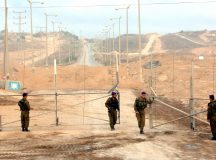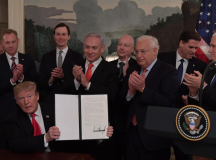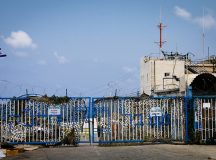Discussing his best selling book ‘Catch 67′, Micah Goodman tracks the evolution of the debate within Israel over the future of the West Bank, arguing that the Israeli Right and Left are now ‘selling fears rather than dreams’ and that giving up on the idea of peace for the time being can actually help improve the situation on the ground. Download a PDF version here.
My book ‘Catch 67, The Left, the Right, and the Legacy of the Six-Day War‘ is not about the Israeli-Palestinian conflict. It is about the Israeli conversation about the conflict – what Israelis are really arguing about. Since the book came out, I have shifted my thinking from conversations about the conflict to the conflict itself and what we can do about it.
The Six-Day War and two visions of victory
The Six-Day War transformed the Right and the Left in Israeli politics and transformed the clash between them. The religious / messianic Right created a new narrative: ‘The Six-Day War was a miracle. In 6 days, Israel returned to biblical lands in Judea and Samaria, and God wants something from us.’ One of the most important theologians who interpreted this event in a way that was compelling for many was the son of Rabbi Abraham Isaac Kook, Tzvi Yehudah, who told his followers that by settling this land one paves the way for redemption. That was a very exciting vision.
The peace camp in Israel didn’t see biblical promises of the Messiah. Rather, it saw that Israel was in possession of the Golan Heights, the West Bank and the Sinai Peninsula which the country’s Arab neighbours wanted back. The peace camp argued that for the first time in Israel’s history it possessed bargaining chips, and if the country were to play its cards right it could trade these assets for a peace treaty that would change Israeli and Jewish history. For the first time Israel would no longer be a fortress state but an organic part of the area.
In Israel we often say that the 7th day of the 6-Day War has lasted for 51 years. On that day two visions emerged regarding what to do with the victory: settle the land and pave the way for redemption, or leave the land in return for a negotiated peace? Both visions had the same understanding: by leveraging victory they could change history and all Israelis would join their camp. Both sides were wrong. Not all Israelis joined either movement. In fact, over the past 52 years most Israelis have become disenchanted with both ideologies.
To echo Yossi Klein Halevi, the First Intifada in 1987 was devastating for the Right. When soldiers first started patrolling Palestinian towns in the West Bank and began chasing children with rocks they asked: ‘Is this really the fulfilment of a messianic vision? We didn’t sign up for this. We’re Israeli patriots and signed up to protect our nation, not police another one.’ At the beginning of the First Intifada only 20 per cent of Israelis favoured a two-state solution. By 1992 that number rose to 70 per cent.
If the First Intifada was a blow to the messianic Right, the Second Intifada was a fatal blow to the messianic Left. This is partially because the Second Intifada is different in nature – if the symbol of the First Intifada was a ten-year old Palestinian holding a rock, the symbol of the Second Intifada was the suicide bomber who murdered over 1,100 Israelis. But the main reason the Second Intifada struck a fatal blow to the Left was because of its timing. It began two months after the Camp David meeting ended in no agreement. There are many stories about what really happened there, but what is important to note is how Israelis experienced it. The Israeli narrative – and that of US President Bill Clinton, US negotiator Dennis Ross and Prime Minister Ehud Barak – is that Barak offered a huge amount of concessions to Arafat including compromises on Temple Mount, partition of Jerusalem and almost complete withdrawal from the West Bank, but Arafat said no. Thus, Israelis could simply not accept the argument that the violence was a result of the occupation, especially as it began only a moment after Israel had offered to end the occupation.
Where did that leave Israel? From the First Intifada, we learnt that most Israeli feel that we cannot stay in the West Bank, cannot control another nation. From the Second Intifada we learn that Israelis felt that Israel cannot leave the West Bank.
Today’s clash between the Right and Left
The Israeli Right had a very powerful and persuasive argument: If Israel leaves the West Bank, then it is putting its existence at peril by threatening its own ability to defend itself. This argument has an interesting history. Israel within its current borders is only 9 miles wide at its shortest point. Most Israelis live in the country’s narrowest area – along the coastal plain which is very close to where the 1967 border would be. They asked themselves what would happen if a new Palestinian state launched a surprise attack on Israel, reflecting on what happened to Israel in 1973 during the Yom Kippur conflict. When Israel was attacked from the north and south simultaneously, the Egyptians and the Syrians managed to conquer roughly 20km until Israel blocked them. So the Right would ask: ‘What would happen if we were surprised, as we were in 1973, but within the 1967 borders?’ After conquering 20km, they would not be in the Golan Heights and the Sinai Peninsula, but in the Mediterranean.’ This argument led many people to believe the current 1967 borders are indefensible, but this is the old argument. The belief that the Palestinian state has a strong army and could surprise Israel now seems a little anachronistic.
Today, the Right argues that now is not the time to create a new state in the Middle East, which has been upended by the 2011 Arab Spring. What if a new Palestine cannot survive the same forces that are tearing apart Syria, Yemen, and Libya? If a new Palestine is susceptible to these forces, then we would have a dysfunctional state very close to Tel Aviv. Who would fill a vacuum of sovereignty in the West Bank? ISIS? Hamas? Maybe Iran and Hezbollah? As an Israeli intelligence officer told me, probably a cocktail of all these forces together. We used to be afraid that a strong Palestine would threaten us, but now we fear a weak, dysfunctional Palestine.
The Left, too, has a good argument based on three points. First, if Israel continues to control the West Bank, then it will become isolated in the international community. Second, the fact there is a military regime in the West Bank controlling a civilian population, is neither ethical, moral nor Jewish. And third, if Israel continues to hold onto the West Bank, it is effectively controlling the life of another people, approximately 2.4 million Palestinians who will in the near future stop fighting for a two state solution and demand instead a vote in the Knesset. When that day comes, Israel will face two very unfavourable options. The first would involve a Jewish minority controlling a Muslim majority; the end of Israel as a democracy and the beginning of apartheid. The second would be a Jewish minority controlled by a Muslim majority; the end of Israel as a Jewish state. These options would mark the end of Zionism.
From utopias to fears
Whereas after the Six Day War, the Right and the Left presented different utopias, after the intifadas the Right and the Left are arguing something different, and they are actually mirror images of each other. The Right no longer declares that if the land is settled, redemption will come, but rather, if will be catastrophic to leave the land and the chaos of the Middle East will enter the West Bank. The Left is no longer arguing that if we leave the West Bank, there will be a new Middle East, as Shimon Peres declared. Instead, they are saying that if Israel stays in the West Bank, it will be isolated diplomatically, collapse ethically and will no longer be a Jewish democracy. Both sides have moved from selling dreams to selling fears. And when the Right and the Left changed, it created a ‘Centre’.
The nature of the original conversation about utopias involved big dreams, visions, and ideologies. But the current debate over anxieties is different. One needs to choose between dreams. But psychologically speaking, one can accumulate many anxieties. And that is exactly what has happened to 70 per cent of Israelis. They are terrified that if Israel leaves the West Bank, its future is under threat. And they are terrified that if Israel stays in the West Bank, its future is in peril. The shift on the Right and Left from dreams to fears has created a confused Centre. It is a centre that is in a Catch 22 (or a Catch 67), whereby if Israel stays in the West Bank, it is threatening its national majority, but if it leaves the West Bank, national security is under threat.
The indifferent Centre
A majority of Israelis have lost their certainty and are confused. Sure, there are still people on the Left who believe that peace is just around the corner and people on the Right who believe redemption is near, but most Israelis have lost their political certainty. And they responded to their confusion by changing the topic of conversation. From 1967-2011 (when social protests over living costs hit Israel), the conflict held all other issues hostage because it took up all of Israel’s time and energy. If there was a protest about peace or war, disarmament or disengagement, tens of thousands, or even hundreds of thousands of people would come to the streets. A protest about social justice would have just 20 people (and it would always be the same people).
Then 2011 happened when thousands of Israelis suddenly left their homes and took to the streets to protest about the prices of homes and cottage cheese. We always thought that we would deal with all these issues after addressing the conflict. But Israelis started to deal with these issues once they believed that they can no longer solve the conflict. The discourse turned towards thinking that the best way to deal with an unsolvable problem was to ignore it, and move onto another issue. However, just because you ignore an issue does not mean it is ignoring you.
What I am trying to do is to create language which enables the confused Israeli Centre to return to the conversation which is now only held by the hard Right and hard Left. The interaction of the hard Right and hard Left on the issue is uncivilised and unproductive. What is needed in Israel, and elsewhere, is a centre that is not indifferent, but one that is passionate, and a centre whose reaction to the conflict is not, ‘We are confused and therefore indifferent, but we’re confused and therefore re-thinking everything again.’
We need our discourse to be more like music than religion. What do I mean? Religion lives in dichotomies – if something is not sacred or pure, it’s profane or impure. If something is not forbidden, it’s permitted. But in music, if I don’t think a particular song is inspiring, I don’t necessarily think it’s disgusting. When we think about music we think in degrees. So how do we think about politics – in terms of degrees of dichotomies? If we think about politics the same way we think about religion, we stop the function of politics; the person you disagree with is not just wrong but is a sinner, so the conversation collapses.
When it comes to the conflict the religious way of thinking created a false dichotomy. Either you can solve the conflict, or you can manage the conflict. Introducing new thinking towards ending the conflict means breaking this false dichotomy. Let’s shrink the conflict. That would be a centrist approach.
What does this mean in practice? Israelis have adopted a false zero-sum game between occupation and security – the more we control the Palestinians the less of a threat they are to us. The less we control them, the more we are threatened. But there are steps that would dramatically minimise the occupation whilst not impacting on the security of Israelis.
Minimising the occupation
As I recently laid out in my article for The Atlantic, there are eight practical steps Israel can make today that can minimise the conflict without impeaching Israeli security.
No Settlement Expansion outside blocs
To facilitate shrinking the conflict, Israel would have to refrain from expanding its settlements outside the major blocs and allocate land in Area C for Palestinian economic initiatives.
Expand the Palestinian Autonomous Zones
The Palestinian autonomous zones are too small for the population and cannot accommodate its current rate of growth. Although Areas A and B have not grown since the 1990s but the population has and as a result, Palestinians have built some 20,000 houses that spill over the boundaries of the autonomous zones. Palestinian towns and villages have no space to develop, creating self-confined and densely packed population centres that require the authorisation of the Israeli army for any changes. In light of this Israel could transfer a few percentage points of territory in Area C to the Palestinians in order to expand the autonomous areas, letting them develop, grow, and prosper.
Land Reallocation
This connects to the next step. The Israel’s Institute for National Security Studies think tank has published a plan – the Political-Security Framework for the Israeli-Palestinian Arena – in which Israel would allocate parts of Area C for Palestinian economic development and industrial estates. The plan would encourage international investment in these areas and create a special credit scheme for loans to build businesses there.
Palestinian workers in Israel
At the same time, a stronger connection to Israel will also increase economic prosperity. Another step that could be taken now is increasing the number of Palestinian workers in Israel. Today, approximately 120,000 West Bankers enter Israel every day to work. Because salaries in Israel are double those in the West Bank for the same work, these workers bring in a lot of money for the economy and those 120,000 workers feed around 600,000-700,000 people. Many people in the Israeli military believe that the number of Palestinian workers entering Israel could increase up to 400,000.
Free Movement
A plan to minimise the conflict would increase physical separation on the one hand and economic connectivity on the other hand. Palestinians should be able to move freely within the West Bank, build where they want, and fly to the US or EU without having to bump into military occupation. The problem in the West Bank at the moment is that the cities are not connected. Someone living in Ramallah might be unable to visit a relative in Nablus on a certain day because the Israeli army for its own reasons won’t let you drive on the road. So each city is its own autonomous area, disconnected from each and every other city. So the fact that the cities are not connected is the real impact and experience of the occupation. So let’s connect them. A plan to do so was proposed by the Israeli military in 2000, involving a road and tunnel system.
Ease Palestinians’ Travel Abroad
The Palestinians do not have their own airport, but the construction of a Palestinian airport would boost Palestinians’ independence at the expense of Israel’s security. Palestinians’ access to the world can be expanded in two ways. First, Israel could greatly reduce waiting time at Allenby Bridge, including by introducing advanced technological means to speed up and ease border crossings. Second, it could enable Palestinians to fly abroad through Ben Gurion Airport via direct, secured shuttles, connecting the West Bank to Israel’s international airport.
International and Local Trade
One of the greatest weaknesses of the Palestinian economy is its isolation from the outside world. A new railroad between Jenin and Haifa and the construction of a Palestinian seaport in Haifa Bay under Israeli supervision would solve this problem.
Economic Independence
One annex of the 1995 Oslo Accords is the Paris Protocol, which makes the Palestinian economy entirely dependent on the Israeli economy and the State of Israel. The Palestinian tax, customs, import, and export systems rely on and are effectively controlled by Israel. The Paris Protocol can and must be revised to end this dependence.
*
These steps would reduce the experience of occupation without reducing security. But people on the Left do not like these steps because minimising occupation means that occupation still exists. And the Right are against the idea of giving up land. As a result, there is an unspoken alliance between Right and the Left that means freezing the status quo. But are we willing to give up the dream of peace in order to make moves on the ground?
We don’t need to wait for a final agreement – we don’t need to give up sovereignty over Temple Mount or the Palestinians give up their demand of ‘Right to Return’. Paradoxically it is the dream of peace that is paralysing us today. And it is giving up on this dream can make things on the ground improve.





































